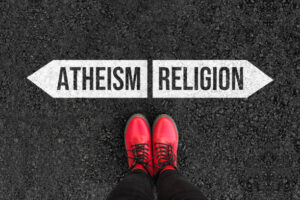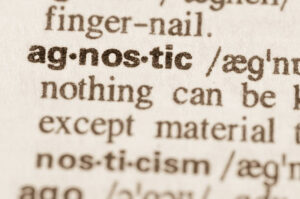In a world rich with diverse belief systems, non-belief stands as a distinct perspective that encompasses a wide range of attitudes towards religious, spiritual, or metaphysical concepts. Non-belief is not a monolithic category; rather, it exists on a spectrum with various shades and nuances. In this exploration, we delve into the intricate landscape of non-belief, shedding light on its different types and the diverse reasons individuals adopt these perspectives.
In the discourse surrounding non-belief, it is essential to address common misconceptions and stereotypes. Non-believers are often unjustly stigmatized as lacking moral values or purpose. However, the diverse range of non-believing perspectives includes ethical frameworks such as secular humanism, emphasizing the importance of compassion, reason, and social justice. By dispelling these stereotypes, we can create an environment where individuals feel free to express their non-belief without fear of judgment.
Atheism: The Absence of Belief in Deities
 (Photo from iStock)
(Photo from iStock)
Atheism, perhaps the most well-known form of non-belief, is characterized by the absence of belief in deities or gods. Atheists do not subscribe to the tenets of any religion and reject the existence of supernatural beings. It is important to note that atheism is not a singular, homogenous stance; instead, it encompasses a spectrum of attitudes ranging from strong atheism, which asserts the non-existence of gods, to weak atheism, which simply lacks belief in gods without making a positive assertion.
Agnosticism: Uncertainty and the Limitations of Knowledge
 (Photo from iStock)
(Photo from iStock)
Agnosticism takes a different approach to non-belief by emphasizing the limitations of human knowledge. Agnostics neither affirm nor deny the existence of deities, asserting that such matters are unknowable or, at the very least, currently beyond the scope of human understanding. The agnostic position is characterized by a willingness to admit the inherent uncertainty surrounding metaphysical questions and a preference for withholding judgment in the absence of conclusive evidence.
Secular Humanism: Embracing Human Values without the Supernatural
 (Photo from iStock)
(Photo from iStock)
Secular humanism is a non-religious worldview that places emphasis on human values and ethics without reliance on supernatural elements. Adherents of secular humanism focus on promoting human welfare, rational thinking, and ethical behaviour, often grounded in reason and empathy rather than religious doctrine. This type of non-belief seeks to build a moral framework independent of religious dogma, emphasizing the importance of critical thinking and compassion in shaping a just and equitable society.
Scepticism: Questioning and Critical Inquiry
 (Photo from iStock)
(Photo from iStock)
Scepticism, while not exclusively a form of non-belief, often aligns with a critical and questioning stance towards supernatural or extraordinary claims. Sceptics approach information with a healthy dose of doubt and require robust evidence before accepting any proposition. This type of non-belief is rooted in the scientific method and the principles of critical inquiry, encouraging individuals to scrutinize ideas and beliefs to ensure they are supported by empirical evidence.
Freethought: Independent Inquiry and Freedom of Belief
 (Photo from iStock)
(Photo from iStock)
Freethought is a philosophy that encourages individuals to form beliefs based on reason, logic, and evidence, free from the constraints of tradition or authority. Freethinkers value intellectual independence and are open to exploring a variety of ideas, unbound by dogma or religious doctrine. This type of non-belief fosters a spirit of curiosity and encourages individuals to challenge prevailing norms, promoting an atmosphere of free inquiry and the pursuit of knowledge.
Apatheism: Indifference towards Religious Questions
 (Photo from iStock)
(Photo from iStock)
Apatheism is characterized by apathy or indifference towards questions of the existence or nature of deities. Individuals who identify as apatheists may find the debate over religious matters uninteresting or irrelevant to their lives. While not explicitly denying the possibility of gods. Apatheists simply do not engage with religious questions and may prioritize other aspects of life over philosophical or metaphysical inquiries.
Igtheism: Questioning the Coherence of God Concepts
 (Photo from iStock)
(Photo from iStock)
Igtheism, also known as theological non-cognitivism, challenges the coherence and meaningfulness of the concept of God. Igtheists argue that the term “God” lacks a clear and universally agreed-upon definition. Making discussions about the existence or non-existence of God inherently ambiguous.
Naturalism: Embracing a Universe Governed by Natural Laws
 (Photo from iStock)
(Photo from iStock)
Naturalism is a philosophical stance that asserts that the natural world, governed by natural laws, is the only reality. This type of non-belief rejects the existence of supernatural entities and phenomena. Emphasizing the importance of empirical evidence and the scientific method in understanding the universe.
Antitheism: Opposition to Belief in God or Gods
 (Photo from iStock)
(Photo from iStock)
Antitheism goes beyond simple non-belief by actively opposing theism and religious belief. Antitheists not only lack a belief in deities but also assert that belief in God or gods is harmful, promoting irrationality, intolerance, and sometimes violence. Eventually, This perspective often critiques religious institutions and practices, viewing them as detrimental to individual freedom. Moreover, societal progress, and ethical behaviour.
Conclusion
The spectrum of non-belief is broad and diverse, reflecting the complexity of human thought. And the myriad ways individuals engage with questions of spirituality. Religion, and metaphysics. From atheism and agnosticism to secular humanism and antitheism. Each type of non-belief brings its unique perspective to the ongoing discourse. Surrounding the nature of existence. As societies continue to evolve. Understanding and respecting the diversity of non-belief becomes crucial for fostering meaningful dialogue. And promoting a more inclusive and tolerant world.
Moreover, fostering constructive dialogue between believers and non-believers is crucial for building bridges and understanding. Respectful conversations that acknowledge the diversity within both religious and non-religious communities can lead to greater tolerance and cooperation. Recognizing the shared values of empathy, reason, and a desire for a just society can serve as common ground. Evidently, facilitating meaningful discussions that transcend theological differences.
In an increasingly interconnected world, where diversity is celebrated, appreciating the various types of non-belief enriches our collective understanding of the human experience. As we navigate the intricate tapestry of beliefs and non-beliefs, embracing a spirit of curiosity, empathy, and open-mindedness can contribute to a more harmonious coexistence among individuals with differing perspectives on the metaphysical aspects of life.




